#no copyright epic music
Text

Man I love this fandom sometimes
#epic the wisdom saga#epic the musical#I survived the epic wisdom saga stream strike/copyright#YouTube: any last words?#Jorge: ALL I GOTTA DO IS START A NEW STREAM#YouTube: WHAT#deadbaguettesrambles
3K notes
·
View notes
Text

I made another one
#getting copyrighted for your own songs is CRAZY#poor Mr Jalapeno#CAPTAIN#CAPTAIN.#epic the musical#epic the wisdom saga#the wisdom saga#epic wisdom saga#epic stream#jorge rivera herrans
68 notes
·
View notes
Text
the universe doesn't feel appreciative/grateful enough that I never commit to making the horror webseries I can think up
#Like ah yes the lost tapes of barney the dinosaur and the man-eating mushrooms#(I wish I was kidding I have an entire song for that one it started w me tying to remember the theme song and ended w a horror parody)#The only reason I don't go make some of that nightmare fuel real is bc it requires time and skills that I'd have to get other ppl for#Also some of them feature preexisting characters and idk when their copyrights end#In the meantime tho I'm working on some epic musical concepts and a wholesome comedy show featuring sock puppets-#My creative range starts at “I love you” and ends with “I wish I could eat you like a spider eats a bug” and does a whole lot in the middle
4 notes
·
View notes
Video
youtube
Entering A Black Hole
3 notes
·
View notes
Audio
(Alexander Nakarada - Royalty Free Music)
4 notes
·
View notes
Video
youtube
[No-Copyright Music] The Moment of Triumph / Epic Music for Video by Max...
2 notes
·
View notes
Text
youtube
#background music for videos#copyright free trailer music#copyright free classical music#no copyright music#non copyrighted music#copyright free music#breakingcopyright#royalty free background music#royalty free movie trailer music#royalty free classical music#royalty free classical music recordings#royalty free classical music download#non copyright classical music#epic trailer music no copyright#music for videos#music for youtube videos#youtube#Youtube
2 notes
·
View notes
Text
Awakening of Legends: Epic Cinematic Music for Your Creative Projects
youtube
"Awakening of Legends" is an epic, royalty-free cinematic music journey crafted to inspire and elevate creative projects. Featuring thunderous orchestration and stirring melodies, it captures the essence of adventure and heroism, making it ideal for filmmakers, content creators, and anyone seeking powerful background music. Perfect for trailers, video games, or personal projects, this track is free to use without copyright concerns. Let its inspiring sound transport you to a world where legends are born.
#artists on tumblr#epic music#new music#music video#music#no copyright#royalty free music#cinematic soundtrack#background music#Youtube
0 notes
Video
youtube
Epic Copyright Free Music Drum And Bass Song 🎶🔥
#youtube#Epic Copyright Free Music Drum And Bass#Copyright Free Music Drum And Bass#bass rebels#digitaltek#best copyright free music for youtube
1 note
·
View note
Text
SOOO...WHAT THE HELL IS THIS


First off, I apologize for tagging artists, but you should know about this shit.
I'll quickly bring you up to speed.
YouTube has slowed down in Russia and the authorities are "recommending" to move to domestic platforms like Rutube, which of course can't compete with YouTube in any way.
So, even earlier my friends and I faced that our work was reuploaded to Rutube without our knowledge.
And this afternoon kind people, threw a couple of screenshots with reuploads to RuTube also other artists. I will attach all these screenshots to this post. Among the artists I know are: @anniflamma @gigizetz @wolfythewitch @mircsy
Unfortunately, RuTube has a very shitty system of copyright reports, where they ask you to provide your personal data (passport, address and DOCUMENTS that prove your copyright), so last time with friends this situation was let go, because there were no serious hits there.
Unfortunately, the only possibility now is to try to throw technical reports, but this is also unlikely to work.
I will also attach links here for some animations
I'm very sorry for this..
#art#stealing#copyright#what the hell#this is not good#gods help us#wolfythewitch#gigi#mircsy#annifamma
1K notes
·
View notes
Video
youtube
Reaching the Sky Long Version Emotional Epic Piano 4k video no copyright
0 notes
Text
Other Characters you can legally use for your Mickey Mouse project

Mickey Mouse is in the public domain, as is Minnie Mouse and Peg-leg Pete. There's some caveats to that, and I talk about that more in this other post, but for now, let's talk about other characters who you can also use to fill out the cast.
These characters should all be in the public domain, though some characters still have treademarks. I'll get into how to use them safely as we go. Anyways, let's start.
Other Disney Characters

Disney obvciously doesn't advertise this, but there's actually quite a few Disney originals who've actually been in the public domain for a while.
The Mad Doctor never had it's copyright renewed, and so it's very technically the first Mickey Mouse cartoon to enter the public domain. Keep in mind, the version of Pluto featured in the short isn't in the domain just yet, but the Doctor himself is free to use.
What's funny is that Disney would later use a version of Doctor for Epic Mickey. Obviously don't use that version of the character.
Aside from the Mad Doctor, we also have Oswald and Ortensia

Yeah, as it turns out, Oswald's been in the public domain for quite a while, but he's still trademarked by Disney. Easy recommendation... use the original "fat" design of the character and have him go by Lucky.
But before Oswald, we have the Alice Comedies
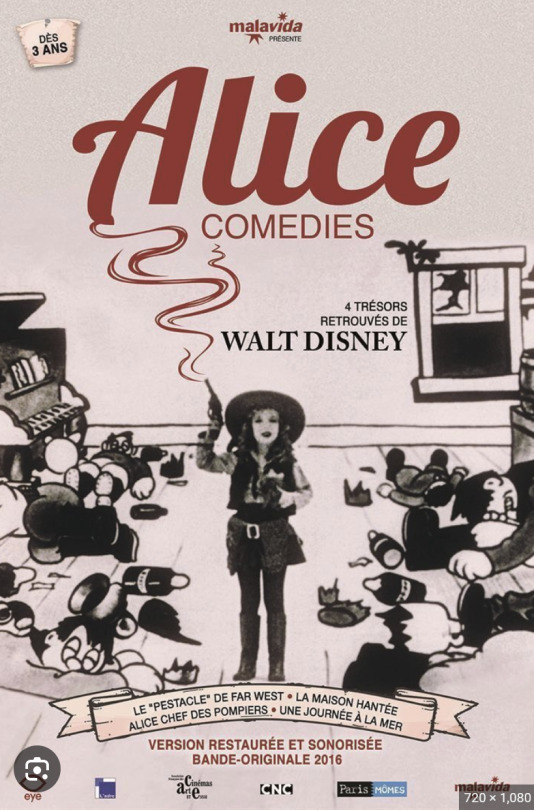
Everything about the Alice Comedies is Public Domain for a long time, and the Disney corporation very rarely acknowlege these characters existence. Which is a shame because These shorts were some of the first shorts Walt ever produced, and they have the unique gimmick of featuring a live action girl in an animated world.
Everybody already knows about Oswald, but nobody talks about Oswald and Mickey's older brother from these shorts, Julius the Cat

Like... yeah no, it didn't all start with a mouse. Or a rabbit. It started with a cat.
Foxy and Milton Mouse
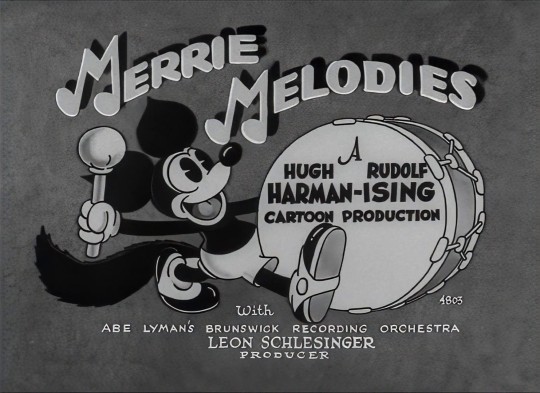
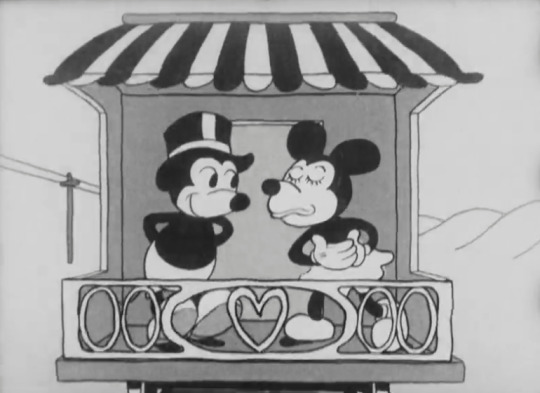
Both Foxy (top) and Milton (bottom, pictured with his girlfriend Rita Mouse) were characters created by Warner Brothers and Van Beuren respectively to cash in on Mickey's success, and both characters are also in the public domain.
In fact, all Van Beuren cartoons are apparently in the public domain, and I encourage you to find their cartoons and use them as you please.
Fleischer Characters
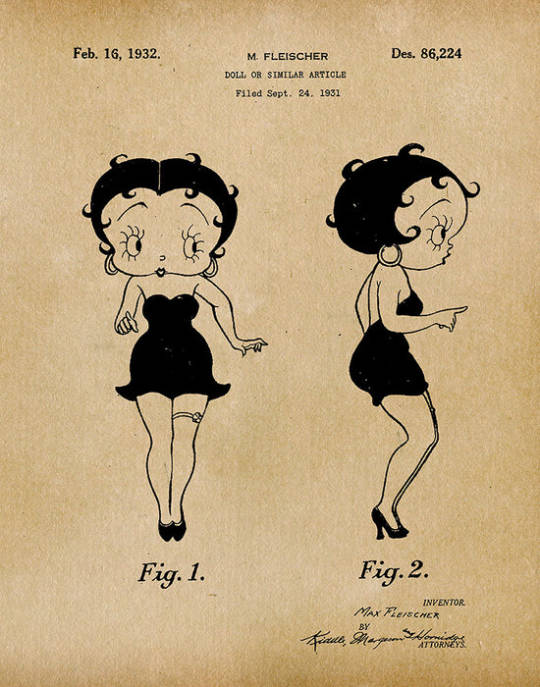
Betty Boop is probably in the Public Domain, but there's a few caveats with this. From what I can tell, the name Betty Boop is trademarked, but the character herself isn't. Most of the old Betty Cartoons are free to use, but newer incarnations, including the versions used in 1985's The Romance of Betty Boop and 1989's The Betty Boop Movie Mystery are still very much under copyright.
To avoid any legal trouble, I have two big recommendations. Although everybody remembers Betty as having Black hair, in one of the few early instances of Betty being shown in color, she's actually depicted as Redhead.
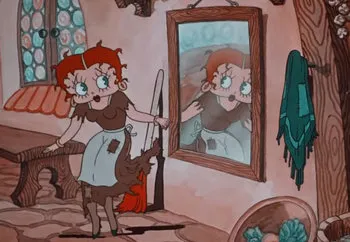
This is Betty Boop in 1934's Poor Cinderella, and her hair color is pretty clearly red.
The other option is to just make her black.
Though there's been some debate as to whether Betty Boop was intentionally modeled after Esther Lee Jones or not, there's still no denying the influence of Jazz on the character. Betty Boop is a Jazz singer and is often depicted dancing to Cab Calloway. Hell, the Betty Boop musical features Jasmine Amy Rogers as the titular character.

Betty Boop aside, there's an entire world of defunct Betty Boop characters who are definately public domain, including Bimbo and Koko the Clown.
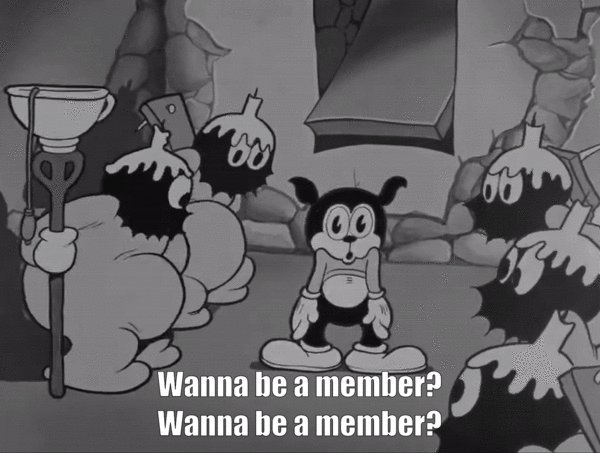
Next year, Popeye's also gonna enter the Domain. So keep an eye out for him too.
Anyways, these are my picks, but obviously this list isn't meant to be comprehensive. There's a ton of old cartoon characters out there who can be freely reinterpreted into newer works. Feel free to add your own favorite public domain cartoon to the list.
#Mickey Mouse#Public Domain#Betty Boop#Koko the Clown#Foxy#Milton Mouse#The Mad Doctor#Oswald the Lucky Rabbit#Alice Comedies#Disney#Walt Disney#Max Fleischer#Warner Brothers.#Cartoons#Animation#Editorial
960 notes
·
View notes
Text
Inkjump Linkdump

For the rest of May, my bestselling solarpunk utopian novel THE LOST CAUSE (2023) is available as a $2.99, DRM-free ebook!

It's the start of a long weekend and I've found myself with a backlog of links, so it's time for another linkdump – the eighteenth in the (occasional) series. Here's the previous installments:
https://pluralistic.net/tag/linkdump/
Kicking off this week's backlog is a piece of epic lawyer-snark, which is something I always love, but what makes this snark total catnip for me is that it's snark about copyfraud: false copyright claims made to censor online speech. Yes please and a second portion, thank you very much!
This starts with the Cola Corporation, a radical LA-based design store that makes lefty t-shirts, stickers and the like. Cola made a t-shirt that remixed the LA Lakers logo to read "Fuck the LAPD." In response, the LAPD's private foundation sent a nonsense copyright takedown letter. Cola's lawyer, Mike Dunford, sent them a chef's-kiss-perfect reply, just two words long: "LOL, no":
https://www.techdirt.com/2024/04/19/apparel-company-gives-perfect-response-to-lapds-nonsense-ip-threat-letter-over-fuck-the-lapd-shirt/
But that's not the lawyer snark I'm writing about today. Dunford also sent a letter to IMG Worldwide, whose lawyers sent the initial threat, demanding an explanation for this outrageous threat, which was – as the physicists say – "not even wrong":
https://www.loweringthebar.net/2024/05/lol-no-explained.html
Every part of the legal threat is dissected here, with lavish, caustic footnotes, mercilessly picking apart the legal defects, including legally actionable copyfraud under DMCA 512(f), which provides for penalties for wrongful copyright threats. To my delight, Dunford cited Lenz here, which is the infamous "Dancing Baby" case that EFF successfully litigated on behalf of Stephanie Lenz, whose video of her adorable (then-)toddler dancing to a few seconds of Prince's "Let's Go Crazy" was censored by Universal Music Group:
https://www.eff.org/cases/lenz-v-universal
Dunford's towering rage is leavened with incredulous demands for explanations: how on Earth could a lawyer knowingly send such a defective, illegal threat? Why shouldn't Dunford seek recovery of his costs from IMG and its client, the LA Police Foundation, for such lawless bullying? It is a sparkling – incandescent, even! – piece of lawyerly writing. If only all legal correspondence was this entertaining! Every 1L should study this.
Meanwhile, Cola has sold out of everything, thanks to that viral "LOL, no." initial response letter. They're taking orders for their next resupply, shipping on June 1. Gotta love that Streisand Effect!
https://www.thecolacorporation.com/
I'm generally skeptical of political activism that takes the form of buying things or refusing to do so. "Voting with your wallet" is a pretty difficult trick to pull off. After all, the people with the thickest wallets get the most votes, and generally, the monopoly party wins. But as the Cola Company's example shows, there's times when shopping can be a political act.
But that's because it's a collective act. Lots of us went and bought stuff from Cola, to send a message to the LAPD about legal bullying. That kind of collective action is hard to pull off, especially when it comes to purchase-decisions. Often, this kind of thing descends into a kind of parody of political action, where you substitute shopping for ideology. This is where Matt Bors's Mr Gotcha comes in: "ooh, you want to make things better, but you bought a product from a tainted company, I guess you're not really sincere, gotcha!"
https://thenib.com/mister-gotcha/
There's a great example of this in Zephyr Teachout's brilliant 2020 book Break 'Em Up: if you miss the pro-union demonstration at the Amazon warehouse because you spent two hours driving around looking for an indie stationer to buy the cardboard to make your protest sign rather than buying it from Amazon, Amazon wins:
https://pluralistic.net/2020/07/29/break-em-up/#break-em-up
So yeah, I'm pretty skeptical of consumerism as a framework for political activism. It's very hard to pull off an effective boycott, especially of a monopolist. But if you can pull it off, well…
Canada is one of the most monopoly-friendly countries in the world. Hell, the Competition Act doesn't even have an "abuse of dominance" standard! That's like a criminal code that doesn't have a section prohibiting "murder." (The Trudeau government has promised to fix this.)
https://www.theglobeandmail.com/opinion/editorials/article-an-overhauled-competition-act-will-light-a-fire-in-the-stolid-world-of/
There's stiff competition for Most Guillotineable Canadian Billionaire. There's the entire Irving family, who basically own the province of New Bruinswick:
https://www.canadaland.com/podcast/dynasties-2-the-irvings/
There's Ted Rogers, the trumpy billionaire telecoms monopolist, whose serial acquire-and-loot approach to media has devastated Canadian TV and publishing:
https://www.canadaland.com/podcast/canadaland-725-the-rogers-family-compact/
But then there's Galen Fucking Weston, the nepobaby who inherited the family grocery business (including Loblaw), bought out all his competitors (including Shopper's Drug Mart), and then engaged in a criminal price-fixing conspiracy to rig the price of bread, the most Les-Miz-ass crime imaginable:
https://www.blogto.com/eat_drink/2023/06/what-should-happened-galen-weston-price-fixing/
Weston has made himself the face of the family business, appearing in TV ads in a cardigan to deliver dead-eyed avuncular paeans to his sprawling empire, even as he colludes with competitors to rig the price of his workers' wages:
https://www.bloomberg.com/news/articles/2020-06-12/a-supermarket-billionaire-steps-into-trouble-over-pandemic-wages
For Canadians, Weston is the face of greedflation, the man whose nickle-and-diming knows no shame. This is the man who decided that the discount on nearly-spoiled produce would be slashed from 50% to 30%, who racked up record profits even as his prices skyrocketed.
It's impossible to overstate how loathed Galen Weston is at this moment. There's a very good episode of the excellent new podcast Lately, hosted by Canadian competition expert Vass Bednar and Katrina Onstad that gives you a sense of the national outrage:
https://www.theglobeandmail.com/podcasts/lately/article-boycotting-the-loblawpoly/
All of this has led to a national boycott of Loblaw, kicked off by members of the r/loblawsisoutofcontrol, and it's working. Writing for Jacobin, Jeremy Appel gives us a snapshot of a nation in revolt:
https://jacobin.com/2024/05/loblaw-grocery-price-gouge-boycott/
Appel points out the boycott's problems – there's lots of places, particularly in the north, where Loblaw's is the only game in town, or where the sole competitor is the equally odious Walmart. But he also talks about the beneficial effect the boycott is having for independent grocers and co-ops who deal more fairly with their suppliers and their customers.
He also platforms the boycott's call for a national system of price controls on certain staples. This is something that neoliberal economists despise, and it's always fun to watch them lose their minds when the subject is raised. Meanwhile, economists like Isabella M Weber continue to publish careful research explaining how and why price controls can work, and represent our best weapon against "seller's inflation":
https://scholarworks.umass.edu/econ_workingpaper/343/
Antimonopoly sentiment is having a minute, obviously, and the news comes at you fast. This week, the DoJ filed a lawsuit to break up Ticketmaster/Live Nation, one of the country's most notorious monopolists, who have aroused the ire of every kind of fan, but especially the Swifties (don't fuck with Swifties). In announcing the suit, DoJ Antitrust Division boss Jonathan Kanter coined the term "Ticketmaster tax" to describe the junk fees that Ticketmaster uses to pick all our pockets.
In response, Ticketmaster has mobilized its own Loblaw-like shill army, who insist that all the anti-monopoly activism is misguided populism, and "anti-business." In his BIG newsletter, Matt Stoller tears these claims apart, and provides one of the clearest explanations of how Ticketmaster rips us all off that I've ever seen, leaning heavily on Ticketmaster's own statements to their investors and the business-press:
https://www.thebignewsletter.com/p/antitrust-enforcers-to-break-up-ticketmaster
Ticketmaster has a complicated "flywheel" that it uses to corner the market on live events, mixing low-margin businesses that are deliberately kept unprofitable (to prevent competitors from gaining a foothold) in order to capture the high-margin businesses that are its real prize. All this complexity can make your eyes glaze over, and that's to Ticketmaster's benefit, keeping normies from looking too closely at how this bizarre self-licking ice-cream cone really works.
But for industry insiders, those workings are all too clear. When Rebecca Giblin and I were working on our book Chokepoint Capitalism, we talked to insiders from every corner of the entertainment-industrial complex, and there was always at least one expert who'd go on record about the scams inside everything from news monopolies to streaming video to publishing and the record industry:
https://chokepointcapitalism.com/
The sole exception was Ticketmaster/Live Nation. When we talked to club owners, promoters and other victims of TM's scam, they universally refused to go on the record. They were palpably terrified of retaliation from Ticketmaster's enforcers. They acted like mafia informants seeking witness protection. Not without reason, mind you: back when the TM monopoly was just getting started, Pearl Jam – then one of the most powerful acts in American music – took a stand against them. Ticketmaster destroyed them. That was when TM was a mere hatchling, with a bare fraction of the terrifying power it wields today.
TM is a great example of the problem with boycotts. If a club or an act refuses to work with TM/LN, they're destroyed. If a fan refuses to buy tickets from TM or see a Live Nation show, they basically can't go to any shows. The TM monopoly isn't a problem of bad individual choices – it's a systemic problem that needs a systemic response.
That's what makes antitrust responses so timely. Federal enforcers have wide-ranging powers, and can seek remedies that consumerism can never attain – there's no way a boycott could result in a breakup of Ticketmaster/Live Nation, but a DoJ lawsuit can absolutely get there.
Every federal agency has wide-ranging antimonopoly powers at its disposal. These are laid out very well in Tim Wu's 2020 White House Executive Order on competition, which identifies 72 ways the agencies can act against monopoly without having to wait for Congress:
https://pluralistic.net/2021/08/13/post-bork-era/#manne-down
But of course, the majority of antimonopoly power is vested in the FTC, the agency created to police corporate power. Section 5 of the FTC Act grants the agency the power to act to prevent "unfair and deceptive methods of competition":
https://pluralistic.net/2023/01/10/the-courage-to-govern/#whos-in-charge
This clause has lain largely dormant since the Reagan era, but FTC chair Lina Khan has revived it, using it to create muscular privacy rights for Americans, and to ban noncompete agreements that bind American workers to dead-end jobs:
https://pluralistic.net/2024/04/25/capri-v-tapestry/#aiming-at-dollars-not-men
The FTC's power to ban activity because it's "unfair and deceptive" is exciting, because it promises American internet users a way to solve their problems beyond copyright law. Copyright law is basically the only law that survived the digital transition, even as privacy, labor and consumer protection rights went into hibernation. The last time Congress gave us a federal consumer privacy law was 1988, and it's a law that bans video store clerks from telling the newspapers which VHS cassettes you rented:
https://en.wikipedia.org/wiki/Video_Privacy_Protection_Act
That's left internet users desperately trying to contort copyright to solve every problem they have – like someone trying to build a house using nothing but chainsaw. For example, I once found someone impersonating me on a dating site, luring strangers into private spaces. Alarmed, I contacted the dating site, who told me that their only fix for this was for me to file a copyright claim against the impersonator to make them remove the profile photo. Now, that photo was Creative Commons licensed, so any takedown notice would have been a "LOL, no." grade act of copyfraud:
https://pluralistic.net/2023/10/21/the-internets-original-sin/
The unsuitability of copyright for solving complex labor and privacy problems hasn't stopped people who experience these problems from trying to use copyright to solve them. They've got nothing else, after all.
That's why everyone who's worried about the absolutely legitimate and urgent concerns over AI and labor and privacy has latched onto copyright as the best tool for resolving these questions, despite copyright's total unsuitability for this purpose, and the strong likelihood that this will make these problems worse:
https://pluralistic.net/2024/05/13/spooky-action-at-a-close-up/#invisible-hand
Enter FTC Chair Lina Khan, who has just announced that her agency will be reviewing AI model training as an "unfair and deceptive method of competition":
https://thehill.com/policy/technology/4682461-ftc-chair-ai-models-could-violate-antitrust-laws/
If the agency can establish this fact, they will have sweeping powers to craft rules prohibiting the destructive and unfair uses of AI, without endangering beneficial activities like scraping, mathematical analysis, and the creation of automated systems that help with everything from adding archival metadata to exonerating wrongly convicted people rotting in prison:
https://hrdag.org/tech-notes/large-language-models-IPNO.html
I love this so much. Khan's announcement accomplishes the seemingly impossible: affirming that there are real problems and insisting that we employ tactics that can actually fix those problems, rather than just doing something because inaction is so frustrating.
That's something we could use a lot more of, especially in platform regulation. The other big tech news about Big Tech last week was the progress of a bill that would repeal Section 230 of the Communications Decency Act at the end of 2025, without any plans to replace it with something else.
Section 230 is the most maligned, least understood internet law, and that's saying something:
https://www.techdirt.com/2020/06/23/hello-youve-been-referred-here-because-youre-wrong-about-section-230-communications-decency-act/
Its critics wrongly accuse the law – which makes internet users liable for bad speech acts, not the platforms that carry that speech – of being a gift to Big Tech. That's totally wrong. Without Section 230, platforms could be named to lawsuits arising from their users' actions. We know how that would play out.
Back in 2018, Congress took a big chunk out of 230 when they passed SESTA/FOSTA, a law that makes platforms liable for any sex trafficking that is facilitated by their platforms. Now, this may sound like a narrowly targeted, beneficial law that aims at a deplorable, unconscionable crime. But here's how it played out: the platforms decided that it was too much trouble to distinguish sex trafficking from any sex-work, including consensual sex work and adjacent activities. The result? Consensual sex-work became infinitely more dangerous and precarious, while trafficking was largely unaffected:
https://www.gao.gov/assets/gao-21-385.pdf
Eliminating 230 would be incredibly reckless under any circumstances, but after the SESTA/FOSTA experience, it's unforgivable. The Big Tech platforms will greet this development by indiscriminately wiping out any kind of controversial speech from marginalized groups (think #MeToo or Black Lives Matter). Meanwhile, the rich and powerful will get a new tool – far more powerful than copyfraud – to make inconvenient speech disappear. The war-criminals, rapists, murderers and rip-off artists who currently make do with bogus copyright claims to "manage their reputations" will be able to use pretextual legal threats to make their critics just disappear:
https://www.qurium.org/forensics/dark-ops-undercovered-episode-i-eliminalia/
In a post-230 world, Cola Corporation's lawyers wouldn't get a chance to reply to the LAPD's bullying lawyers – those lawyers would send their letter to Cola's hosting provider, who would weigh the possibility of being named in a lawsuit against the small-dollar monthly payment they get from Cola, and poof, no more Cola. The legal bullies could do the same for Cola's email provider, their payment processor, their anti-DoS provider.
This week on EFF's Deeplinks blog, I published a piece making the connection between abolishing Section 230 and reinforcing Big Tech monopolies:
https://www.eff.org/deeplinks/2024/05/wanna-make-big-tech-monopolies-even-worse-kill-section-230
The Big Tech platforms really do suck, and the solution to their systemic, persistent moderation failures won't come from making them liable for users' speech. The platforms have correctly assessed that they alone have the legal and moderation staff to do the kinds of mass-deletions of controversial speech that could survive a post-230 world. That's why tech billionaires like Mark Zuckerberg love the idea of getting rid of 230:
https://www.eff.org/deeplinks/2021/03/facebooks-pitch-congress-section-230-me-not-thee
But for small tech providers – individuals, co-ops, nonprofits and startups that host fediverse servers, standalone group chats and BBSes – a post-230 world is a mass-extinction event. Ever had a friend demand that you take sides in an interpersonal dispute ("if you invite her to the party, I'm not coming!").
Imagine if your refusal to take sides in a dispute among your friends – and their friends, and their friends – could result in you being named to a suit that could cost hundreds of thousands of dollars to settle:
https://www.engine.is/news/primer/section230costs
It's one thing to hope for a more humane internet run by people who want to make hospitable forums for online communities to form. It's another to ask them to take on an uninsurable risk that could result in the loss of their home, their retirement account, and their life's savings.
A post-230 world is one in which Big Tech must delete first and ask questions later. Yes, Big Tech platforms have many sins to answer for, but making them jointly liable for their users' speech will flush out treasure-hunters seeking a quick settlement and a quick buck.
Again, this isn't speculative – it's inevitable. Consider FTX: yes, the disgraced cryptocurrency exchange was a festering hive of fraud – but there's no way that fraud added up to the 23.6 quintillion dollars in claims that have been laid against it:
https://cdn.arstechnica.net/wp-content/uploads/2024/03/US-v-SBF-Alameda-Research-Victim-Impact-Statement-3-20-2024.pdf
Without 230, Big Tech will shut down anything controversial – and small tech will disappear. It's the worst of all possible worlds, a gift to tech monopolists and the bullies and crooks who have turned our online communities into shooting galleries.
One of the reasons I love working for EFF is our ability to propose technologically informed, sound policy solutions to the very real problems that tech creates, such as our work on interoperability as a way to make it easier for users to escape Big Tech:
https://www.eff.org/interoperablefacebook
Every year, EFF recognizes the best, bravest and brightest contributors to a better internet and a better technological future, with our annual EFF Awards. Nominations just opened for this year's awards – if you know someone who fits the bill, here's the form:
https://www.eff.org/nominations-open-2024-eff-awards
It's nearly time for me to sign off on this weekend's linkdump. For one thing, I have to vacate my backyard hammock, because we've got contractors who need to access the side of the house to install our brand new heat-pump (one of two things I'm purchasing with my last lump-sum book advance – the other is corrective cataract surgery that will give me lifelong, perfect vision).
I've been lusting after a heat-pump for years, and they just keep getting better – though you might not know it, thanks to the fossil-fuel industry disinfo campaign that insists that these unbelievably cool gadgets don't work. This week in Wired, Matt Simon offers a comprehensive debunking of this nonsense, and on the way, explains the nearly magical technology that allows a heat pump to heat a midwestern home in the dead of winter:
https://www.wired.com/story/myth-heat-pumps-cold-weather-freezing-subzero/
As heat pumps become more common, their applications will continue to proliferate. On Bloomberg, Feargus O'Sullivan describes one such application: the Japanese yokushitsu kansouki – a sealed bathroom with its own heat-pump that can perfectly dry all your clothes while you're out at work:
https://www.bloomberg.com/news/articles/2024-05-22/laundry-lessons-from-japanese-bathroom-technology
This is amazing stuff – it uses less energy than a clothes-dryer, leaves your clothes wrinkle-free, prevents the rapid deterioration caused by high heat and mechanical agitation, and prevents the microfiber pollution that lowers our air-quality.
This is the most solarpunk thing I've read all week, and it makes me insanely jealous of Japanese people. The second-most solarpunk thing I've read this week came from The New Republic, where Aaron Regunberg and Donald Braman discuss the possibility of using civil asset forfeiture laws – lately expanded to farcical levels by the Supreme Court in Culley – to force the fossil fuel industry to pay for the energy transition:
https://newrepublic.com/article/181721/fossil-fuels-civil-forefeiture-pipeline-climate
They point out that the fossil fuel industry has committed a string of undisputed crimes, including fraud, and that the Supremes' new standard for asset forfeiture could comfortably accommodate state AGs and other enforcers who seek billions from Big Oil on this basis. Of course, Big Oil has more resources to fight civil asset forfeiture than the median disputant in these cases ("a low- or moderate-income person of color [with] a suspected connection to drugs"). But it's an exciting idea!
All right, the heat-pump guys really need me to vacate the hammock, so here's one last quickie for you: Barath Raghavan and Bruce Schneier's new paper, "Seeing Like a Data Structure":
https://www.belfercenter.org/publication/seeing-data-structure
This is a masterful riff on James C Scott's classic Seeing Like a State, and it describes how digitalization forces us into computable categories, and counts the real costs of doing so. It's a gnarly and thoughtful piece, and it's been on my mind continuously since Schneier sent it to me yesterday. Something suitably chewy for you to masticate over the long weekend!

If you'd like an essay-formatted version of this post to read or share, here's a link to it on pluralistic.net, my surveillance-free, ad-free, tracker-free blog:
https://pluralistic.net/2024/05/25/anthology/#lol-no
#pluralistic#lol no#censorship#slapp#lapd#cola#canada#loblaws#guillotine watch#galen weston#vass bednar#podcasts#linkdump#linkdumps#eff#eff awards#trustbusting#monopolies#livenation#ticketmaster#ticketmaster tax#cda 230#section 230#communications decency act#fediverse#lina khan#ai#ftc
145 notes
·
View notes
Text
The Red Circle Pt. 3 (SPOILERS)
*Cutely drops my notes*
John’s REALLY struggling with the tech. I almost feel bad for the guy (almost).
Aww the episode starts off with John asking the gang (Mariana & Sherlock) if they’re okay after finding a dead body. Always nice he checks in with them!
“The good doctor here” SHERLOCK COMPLIMENTING JOHN
Imani’s back, yay!
Oh no, poor Imani…
This exchange:
Imani: “Sorry about this” (sending another red circle pic)
Mariana: “No no no-don’t be sorry”
Sherlock: “Yes you musn’t it’s fantastic”
John: “Sherlock”
Gregson and Mariana are formerly meeting!
THE MUSIC IN THIS CASE OMG ITS SO GOOD!!!
John, you’re playing Italian Mob style music to “capture the mood”?? What happened to “not wanting to stereotype?!”
JOHN JUST REPLACE THE MIC GODDAMNIT
“Ahh do I have a PTSD friend?” John’s new method to making friends apparently
Mariana’s right this is stupid just GET A NEW MIC!! You can still keep the old one, John!
I now have a mental image of Sherlock staring wide-eyed at a big tv like he’s in a trance and I LOVE it
Aww possible future movie nights with a new tv!!
DONALD TRUMP JUMPSCARE
Wives of Cheshire comeback HA!!
“Oh you out of your trance are you?” Seriously how mesmerized was Sherlock to the tv for John to make this joke TWICE?!
Mariana discovers the next clue, awesome!
Sherlock: “I don’t seem to have (seat)belt”, Gregson: “What a shame” Gregson you’re such a salty bitch and I love you for it
Poor John trying to get around copyright stuff
“That’s a good start, you did knock and you did say please-“ another sweet moment of Sherlock getting better with social norm stuff
Wow John is REALLY stressed, and Sherlock is NOT helping
Hehe Sherlock is an iPad kid confirmed
I’m starting to love John calling Sherlock ‘Sherls’
“What’s the Site manager like? Is he…she…they?” John says nonbinary rights
John: Ah I’ve stepped in piss”, Sherlock: “Show me the urine”…um what???
You really can’t catch a break your shoes, huh John?
I’m listening to Sherlock and John talk about possibly reaching down into toilets in order to solve the case…man I love this podcast
John: “You’re doing the next one”, Sherlock: *sharp inhale* “fine” tbf Sherlock this was YOUR idea
“The Patreon numbers are gonna collapse” no such thing sir I’ve checked and we’re all here and loving this
Sherlock: “Imani would you perhaps like to have a go?”, Imani: “No”, Sherlock: “Bugger” I love how quickly he says it
Neuralizer mention! I love the Men in Black movies so much
OOOH, John and Sherlock making the realization at the same time!
Sherlock why do you always have a gun??
NOT THE CHIPMUNK VOICES DURING AN EPIC MOMENT
“English pigs, wot?” John sounded so genuinely confused by that
AHHHHHHH CLIFFHANGERS, THE BANE OF MY EXISTENCE!!!!!!
Okay as painful as that cliffhanger is, this case is getting GOOD! I’m loving it. It’s definitely jumping up to my top five fave cases from the podcast. I was not expecting the case to be as silly as it is, and I’m absolutely relishing in it. I love the irony of John insisting this case is gonna be a bad one when I’m loving every minute of it! Alright everybody, now we just have to not die from waiting on the last part…see y’all next week!
#sherlock and co#sherlock & co#sherlock holmes#john watson#mariana ametxazurra#sherlock and co spoilers#sherlock & co spoilers#the red circle
64 notes
·
View notes
Text
Anyone looking to get into Epic: The Musical, right now the stream of all currently released songs in order with lyrics and animatics is still available!
it did get copyright struck for *checks notes* containing its own songs, so the last ten minutes are in this stream, but highly recommend checking it out! it's a very fun time with wonderful voices artists and story and so many inside jokes/shenanigans <3
28 notes
·
View notes
Text
the funny thing about joel's videos is that you'll be watching the most mundane thing like him mining copper and there'll be the most epic copyright-free rock music playing in the background and joel himself will be doing a dramatic voiceover and it's just like Damn this man knows how to Make Things Work when it comes to video editing
like seriously i'm getting an adrenaline rush watching him lay out copper to oxidise it's ridiculous
115 notes
·
View notes